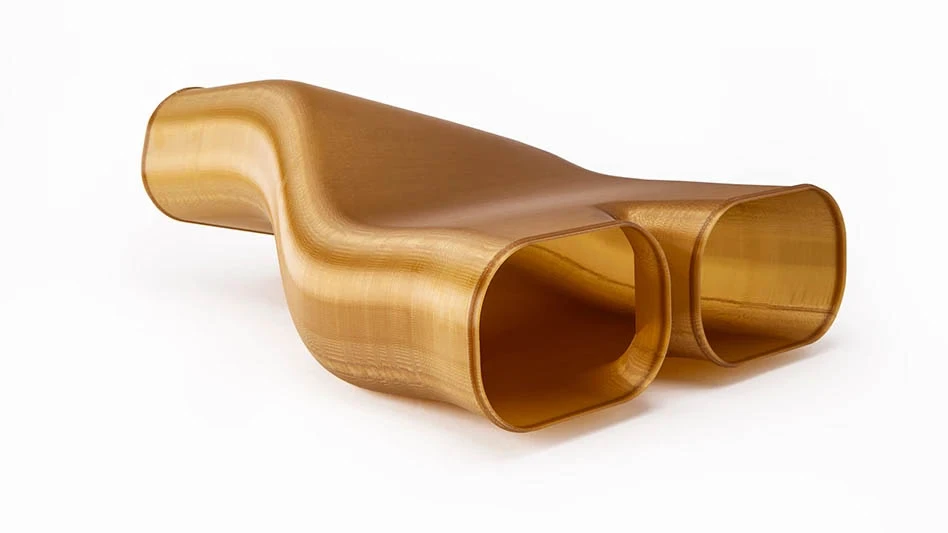 Demands from the aerospace and automotive industries for more efficient and lighter products are driving the development of new and exotic materials. As these materials become more advanced, they are challenging traditional manufacturing methods and driving advances in cutting-tool complexity and design.
Demands from the aerospace and automotive industries for more efficient and lighter products are driving the development of new and exotic materials. As these materials become more advanced, they are challenging traditional manufacturing methods and driving advances in cutting-tool complexity and design.
These industries are increasingly using materials such as carbon fiber reinforced plastic (CFRP) that offer advantages in performance and fuel efficiency due to their increased strength-to-weight ratio. A result of this trend is the increasing demand for polycrystalline diamond (PCD) cutting tools due to their longer tool life, superior cutting capabilities, and 500 times higher abrasive resistance than tungsten carbide.
Composite use increasing
Materials used in aircraft construction have continued to evolve and have recently moved to an increased use of alloys and non-metals. With the Boeing 787 Dreamliner, advanced composites make up 50% of the weight and the airliner is the world’s first major one to use composite materials as the primary material in the airframe construction. The 787 is designed to be lighter, 20% more fuel efficient, quieter, and cheaper to maintain. It can also be made from recyclable materials designed to produce fewer emissions.
These new aircraft materials have differing characteristics, which has prompted cutting tool manufacturers, such as Precorp Inc. in the USA, to develop new types of tools, geometries, and materials specifically optimized for cutting composites and alloys.
 Real world testing
Real world testing
Precorp manufactures PCD cutting tools and is a key supplier to aerospace companies, such as Boeing for its production of the 787 Dreamliner. Precorp’s experience in PCD tools provided the ideal assistance for the development of the ANCA EDGe erosion and grinding machine, ensuring it would meet the demands of industry and perform in a production environment.
Company President Richard Garrick states the ANCA EDGe had been beneficial in many ways towards the company’s success.
“A key part of Precorp’s strategy is to constantly push existing manufacturing technology to achieve a technical advantage and differentiation in the market place. Key to this is partnering with machine suppliers that are willing to push technology and think ‘outside the box.’ ANCA has always represented themselves to us as one of these suppliers,” Garrick continues.
ANCA EDGe technical specifications
|
“Our work together on ANCA’s new EDGe has moved erosion technology forward with regard to the manufacturing of PCD drills and end mills. The EDGe facilitates the production and reconditioning of PCD drills, which will, in turn, allow PCD drills and tools to be more widely used. The EDGe will allow the reconditioning of PCD tools in applications where traditionally it has been cost prohibitive. Going forward we will continue to grow our relationship with ANCA and other suppliers that continue to deliver a technical advantage for our manufacturing processes,” Garrick says.
University research partner
Working in close partnership with the Royal Melbourne Institute of Technology (RMIT), in Melbourne, Australia, ANCA was able to achieve extreme versatility with the eSpark erosion generator. Kotler Tee, lead researcher and developer from RMIT, realized the potential of putting erosion intelligence into the generator itself.
“The ANCA eSpark generator is able to monitor and control the energy level and gap distance of each and every spark. The inbuilt intelligent adaptive control (IAC) adjusts and maintains the optimum spark gap distance based on the energy of each spark,” Tee says. “This is important when eroding complex geometries, such as PCD veined flutes, complex gashing moves, and variegated profiles. The IAC also automatically adjusts the machine feed rate for superior erosion speed. As erosion speeds change due to changes in the tool’s geometry, the IAC optimizes feed rate to account for this.”
ANCA’s project in affiliation with the Advanced Manufacturing Cooperative Research Centre (AMCRC) and RMIT on diamond tool manufacturing was awarded one of the Cooperative Research Centres Association (CRCA) Excellence in Innovation awards in 2014. ANCA works closely with research institutions to develop technology and solutions for their customers that are the latest available.
Another feature of the eSpark generator is the adaptive spark control. This feature, utilizing inbuilt EtherCAT communication, monitors the energy level of each spark based on the conductivity of the substrate it is eroding (tungsten carbide, diamond, or cobalt binder). Appropriate tuning of each spark leads to less cobalt leaching, a reduction in undercut, a stronger cutting edge, and a finished tool that is less prone to chipping.
Eroded PCD tools beat ground
“What this equates to is minimum thermal damage, superior surface finish and decreased manufacture time,” says Duncan Wellesley, one of Precorp’s senior project engineers. “This is obviously desirable for our customers. It means that we are able to provide more robust tools with improved cutting performance that require less resharpening and have a greater service life.”
ANCA EDGe overview
|
The partnership with Precorp has allowed ANCA to measure and benchmark the performance of the tools being manufactured on the EDGe machine. Comparative testing between a ground drill and an EDGe-eroded drill showed that the ANCA machine produces a higher performance tool. EDGe-eroded tools resulted in better figures for cutting force, exit burrs, and drill life. “The tools eroded on the EDGe are producing drills with a keener cutting edge than what we have seen on ground drills,” Garrick says.
“The holes drilled with these tools are producing less exit burrs and delamination, which is highly desirable when using them on composite materials stacks, for example CFRP, aluminum, and titanium.”
The EDGe erosion and grinding machine is suited to a wide variety of industry tools and applications and provides customers with a new option for producting accurate and powerful PCD tools to deal with the increasing percentage of composites on the market.
ANCA Inc.
www.anca.com
IMTS 2014 booth #N-7414
Precorp
www.precorp.net

Explore the July 2014 Issue
Check out more from this issue and find your next story to read.
Latest from Aerospace Manufacturing and Design
- Essential strategies to protect your data
- NASA selects instruments for Artemis lunar terrain vehicle
- Twin-cutter boring head
- Bell awarded funding for X-plane build phase of SPRINT program
- Shaft coupling clamps
- #46 Lunch + Learn Podcast with SMW Autoblok
- Gleason Corp. acquires the Intra Group of Companies
- Thread milling cutter reduces cutting pressure, vibration





